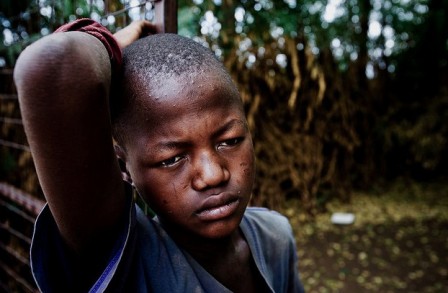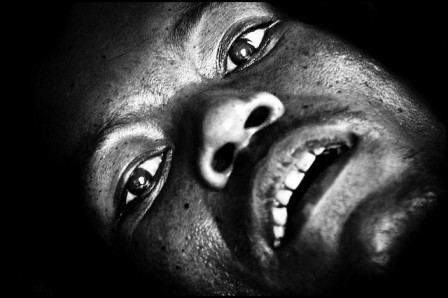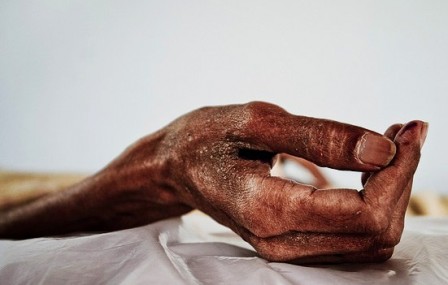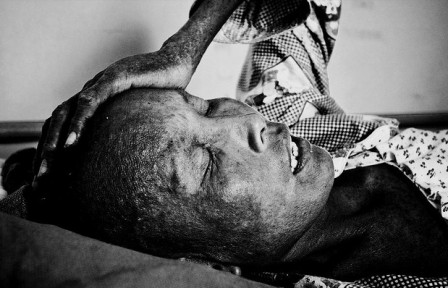Bailing out the Dying: In the fight against AIDS, The Good News is–Hopelessness is a Lie
By Kenneth Lipp
Countries spent an average of 16.9 percent of their GDP, worldwide, bailing out banks and private financial institutions (source: World Bank- “A User’s Guide to Banking Crises”) in the year 2000. The original allocation for the now infamous bailout of U.S. leviathans such as Goldman-Sachs was 700 billion dollars, and though the full amount doled out will likely remain a mystery, the total spent on saving financiers from their own insipid greed has been estimated at as high as 4 trillion.
The poor in the developing world are facing a particularly daunting future in our current socio-political and economic climate. There are ten million people who are in need of urgent treatment for HIV in Sub-Saharan Africa alone; and though treatments have progressed, prospects for those suffering, often in ignorance, continue to look increasingly grim– for two primary reasons.
First, the worldwide decline in funding could be truly catastrophic by or before the end of this year. Western governments, which are reducing their contributions to the Global Fund to Fight AIDS, Tuberculosis and Malaria, and the United States, which is flat-lining the US president’s Emergency Plan for AIDS Relief, do it all on the ostensible rationale of the financial crisis. And that line is utter nonsense. There’s never a financial crisis when you have to bail out the banks or provide a stimulus package… there’s only a financial crisis when you’re dealing with global public health and putting people at risk.
Secondly, there is a determination to expand the portfolio of health interventions in a way that is prejudicial against the work on HIV and AIDS. No one, least of all AIDS activists, would have funds denied those working on malaria, reproductive health, or non-infectious diseases. But it is clear that HIV will prove to be the worst pandemic in human history – 30 million people dead, 33 million people infected… 15 million orphans – one cannot turn one’s head and pretend that this is not exceptional.
To carry on like this is an ethical nightmare. Available right now at fairly little expense are drug cocktails that can preserve quality of life indefinitely; those infected, if diagnosed within the first few years of HIV virulence and started immediately on treatment need literally never develop AIDS or become symptomatic after acquiring the virus. So when shall we stop anointing the feet of those who rob us of our livelihood and feed off of the misfortunes of others, deferring help from those that need it most?
The challenge of meeting human development needs while protecting the earth’s life support systems confronts scientists, technologists, policy makers, and communities from local to global levels. Most believe that science and technology must play a more central role in sustainable development, yet little systematic scholarship exists on how to create institutions that effectively harness it for sustainability, because research into such paradigm shifting measures is kneecapped by the greed of pharmaceutical companies and illusions of financial imperatives. We would be led to believe that this is their lot; that there is no solution to this plague. And this is a reprehensible falsehood.
Key is that efforts to mobilize scientific advancement for sustainability are more likely to be effective when they manage boundaries between knowledge and action in ways that simultaneously enhance the salience, credibility, and legitimacy of the information they produce. Effective systems apply a variety of institutional mechanisms that facilitate communication, translation and mediation across boundaries.
A capacity for mobilizing and using science and technology is increasingly recognized as an essential component of strategies for promoting sustainable development. Efforts to enhance such capacity over the past quarter century range from developing more efficient cook stoves for burning biomass, to nurturing an international system for agricultural research, to applying research and development to the challenges of stratospheric ozone depletion. In this pursuit, there have been few successes and many failures. Such a mixed experience contains lessons in how to improve the effectiveness of linking knowledge to action. Generally lacking, however, has been the systematic scholarship needed to extract those lessons for general use. As a result, society lacks a critical understanding regarding which kinds of programs, institutional arrangements, and, more generally, “knowledge systems” can most effectively harness advance for sustainability.
Dr. Eliya Zulu of the Unversity of Lilongwe notes that “currently there is a lack of reliable and accessible scientific evidence needed to inform development policy because the vast amount of research conducted across Africa is largely inaccessible to policymakers because it is fragmented in numerous scientific journals and not packaged clearly.”
Dr. Jotham Musinguzi, the Director of Partners in Population and Development Africa Regional Office, argues that “policy makers need consistent cutting edge research to guide their decisions, particularly evidence that help them understand the likely consequences of action or inaction.”
Our main objectives ought to be helping to make research add value to development efforts by synthesizing and generating cutting edge evidence, to proactively work with policy makers to ensure that the evidence informs public policy and is translated into more effective programs, and to identify knowledge gaps so that the most needed knowledge will be available for policy and program development–but most importantly, to insure that information of high quality and fidelity is available on the local level.
Editor’s Note: All photographs courtesy of Zoriah. Kenneth Lipp is a researcher in both primate and human genetics, and writes regularly on issues of public health and international health care policy. He has published research on telomere attrition and cellular aging in various peer-reviewed publications, and is an avid advocate of human rights.
Related Articles

















5 Responses to Bailing out the Dying: In the fight against AIDS, The Good News is–Hopelessness is a Lie
You must be logged in to post a comment Login